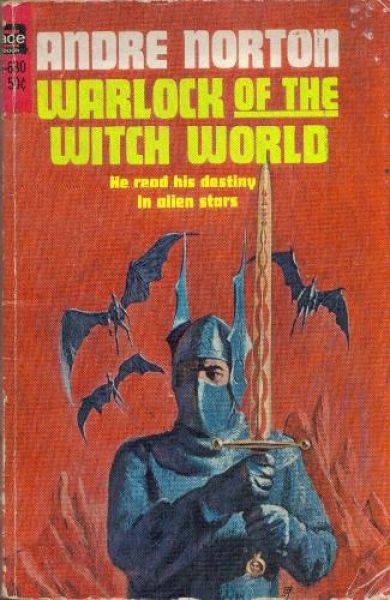The Warlock’s Tale
Warlock of the Witch World (Estcarp, volume 4)
By Andre Norton

31 Jul, 2015
0 comments
1967’s Warlock of the Witch World is the sequel to Norton’s 1965 Three Against the Witch World. Having journeyed east to Escore, a long forgotten part of their world, siblings Kyllan (the warrior), Kemoc (the scholar), and Kaththea (the witch) are now caught up in the war between light and darkness that divides that ancient land.
Rather inconveniently for the siblings, they will find themselves divided in their choice of allies: light or darkness? Are they sure which side is which?
An impressive scholar, Kemoc also has a small gift for magic, a trait for which he can thank his parents Simon Tregarth and Lady Jaelithe. Of course, his homeland of Estcarp being what it is, he’s never had any particular training in magic; that is reserved for women. Nevertheless, he is the sole sibling to notice that there’s something indefinably wrong about their supposed ally, Dinzil.
Having narrowly escaped a kidnapping, Kemoc rejoins his allies only to discover that in his absence Kaththea has vanished with Dinzil. It seems that Dinzil has convinced Kaththea to follow him to a myserious Place of Power. Convinced … or compelled? Although Kyllan is sure that no one as powerful as Kaththea could be compelled against her will, Kemoc is also sure that something is wrong. He sets out to find and rescue his sister.
Following in Kaththea and Dinzil’s footsteps, Kemoc encounters three items of great use to him. One is inanimate — a magic sword [1] — but the other two are people: Orsya, a Krogan, whose knowledge and bravery will be invaluable, and the great seer Loskeetha, whose mystic insights will likewise be useful.
Useful but not comforting. Loskeetha can see three possible futures for Kemoc and Kaththea, and all of them end in Kaththea’s death at Kemoc’s hands. What is even worse is that Kemoc will belatedly realize thatdeath at his hands might not be the worst possible fate for Kaththea. The worst thing may already have happened.
Dinzil is a Great Dark One and Kaththea may be his willing ally.
~oOo~
Kaththea sure seems to prone to being carried off (willingly and otherwise) by beings of power. It must run in the family; her two brothers also seem to attract kidnappings and geases.
If read on its own, without the context of the other Witch World novels, this book might seem to be one of those fantasy novels where the greatest possible danger to the world is that somewhere some woman might have immense power and knowledge [2]. However, we know from the other books in the series that the Witch World has lots of women with power, women whose track record is neither notably better nor notably worse than that of the men. Kaththea just happens to be out on the far edge of the Witch-World-Women-with-Power wisdom bell curve, towards the “overcome by hubris and bad judgment” side of the graph.
But even in this novel, there are women like Orsya, Loskeetha, and the Lady of Green Silences, all of whom have uncanny insight, arcane knowledge and/or mystical abilities and all of whom show uncommonly good judgment.
At the risk of pissing off all the Norton fans out there … I found myself wondering if Kemoc decided that Dinzil was a Bad Guy because Kemoc correctly used his paranormal senses to suss Dinzil out, or because Kemoc seems inclined to see any man in whom his sister takes an interest as deeply suspect. Which I am sure is merely due to brotherly protectiveness and not anything more unsavoury.
Escore seems to be home to a number of humanoid species, more than can be found to the west. This may not be due to the fact that Escore appears to be riddled with inter-dimensional gates because that fact is in no way unique to Escore. The Witch World seems to be a terminus for quite a few other universes. You would probably have a hard time finding a region of a decent size that didn’t have a gate or two hiding in the shadows. Even so, humans seem to have managed to mostly displace all the older races elsewhere on the planet [3], I hope that the encroaching trio are not the beachhead of a human invasion that will radically reduce Escore’s species diversity
I found the book’s resolution somewhat disappointing. There is a third, final, book in this trilogy, one told from Kaththea’s point of view. I hope all ends well for her.
Very conveniently, all three books in this trilogy — Three Against the Witch World, Warlock of the Witch World, and Sorceress of the Witch World — are available in Tor’s omnibus Lost Lands of the Witch World.
1: Witch World is very old. Various mages, witches, gods, and other eldritch beings have been casually discarding magic items throughout its history. Magic Items of Great Power seem to be to the Witch World what plastic and garbage are to the North Pacific Gyre.
2. I was reminded of Chris Claremont’s Dark Phoenix Saga [link]. This isn’t a compliment; in the end, Claremont’s solution to Jean Grey’s nigh godlike abilities was to depower her, one of the standard methods of dealing powerful women in comics. That was not enough for Claremont’s editor Jim Shooter, who insisted death was the only proper solution. This is also a standard method.
3: Granted, we know from a previous Witch World book that at least one Old Race left willingly, the Witch World’s analog of White Flight.
